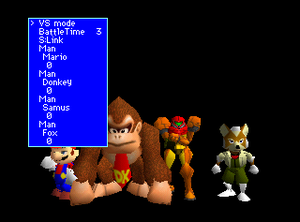Debug menu: Difference between revisions
BlindColours (talk | contribs) m (→Function) |
BlindColours (talk | contribs) mNo edit summary |
||
| Line 1: | Line 1: | ||
{{ArticleIcons|ssb=y|melee=y}} | {{ArticleIcons|ssb=y|melee=y|ssbb=yes}} | ||
[[Image:Debug Menu.png|300px|thumb|The Combat Debug menu in ''Super Smash Bros.''|right]]The '''debug menu''' is a special menu in ''[[Super Smash Bros.]]'' and ''[[Super Smash Bros. Melee]]'' that players can access with the use of an [[Action Replay]]. The code that accesses the debug menu depends on the version of ''Melee'' they have. | [[Image:Debug Menu.png|300px|thumb|The Combat Debug menu in ''Super Smash Bros.''|right]]The '''debug menu''' is a special menu in ''[[Super Smash Bros.]]'' and ''[[Super Smash Bros. Melee]]'' that players can access with the use of an [[Action Replay]]. The code that accesses the debug menu depends on the version of ''Melee'' they have. | ||
Revision as of 21:55, July 2, 2011
The debug menu is a special menu in Super Smash Bros. and Super Smash Bros. Melee that players can access with the use of an Action Replay. The code that accesses the debug menu depends on the version of Melee they have.
Function
The debug menu was a feature that was used by the developers to test certain aspects in the game. The developers never removed the debug menu from the game. As a result, hackers were able to access the menu with cheats and codes. The debug menu allows a player to do many different things in the game. The player can gain access to any character, stage, item, and mode in the game,including those not accessible through normal play. They can also view all the trophies, character endings, and other features. It is highly recommended that it is not used with a memory card plugged in.
In SSB
In order to get to the Debug Menu, a GameShark or an emulator must be used.
- Note: SSB has a Combat Debug Menu and a System Debug Menu. The former tests the aspects of the fighters to see what's right for the game. The latter is used for making changes to the game directly on the N64, so programmers wouldn't have to return to the computer.
Combat Debug Includes:
- The player can gain access to any stage, even the ones that are not in the final game, such as Kirby Beta Stage 1 or Kirby Beta Stage 2.
- The player can gain access to any character, as well as boss characters.
- The player can adjust the damage of each character. (Adjusting damage was not possible in the original game and Melee. In Brawl, one can adjust it via Handicaps).
- The player can make the CPU characters always stop, walk, run, or attack.
- Changes cannot be saved.
System Debug Includes:
- The player can play all sound effects, including ones not included in the final game, such as (what are presumed to be) Final Smashes.
- The player can test 3D animations, such as a paper airplane.
- The player can watch "New Character Signals" for every character.
- Changes can be saved.
In Melee
In order to get to the Debug Menu, an Action Replay or an emulator must be used.
- Note: The Combat and System Debug Menus are combined.
Features include:
- The player can gain access to any stage, even ones not included in the final game, such as AKANEIA.
- The player can gain access to any character, including Bosses and even Sandbag.
- The player can make the CPU characters always stop, walk, run, and attack.
- The player can use modes and CPU behaviors used in Events.
- The player can erase data on the Memory Card.
In Brawl
Brawl does not have a Debug Menu, but there are test modes when a player hacks the game.
Videos
Trivia
- There is a Kirby reference in the background SSB System Debug Menu. EarthBound also has this in its debug menu.
- In the SSB Combat Menu, there is no music, unlike in Melee, where the menu music is running.
